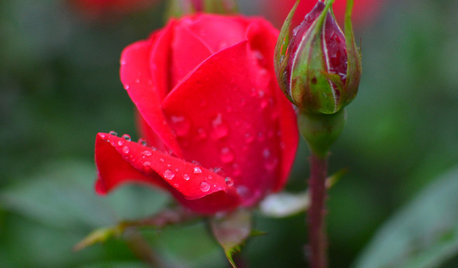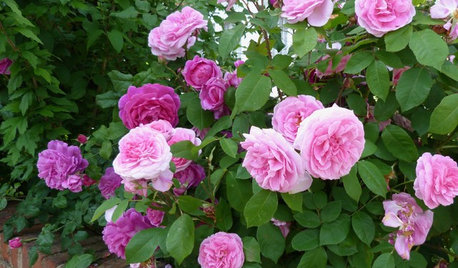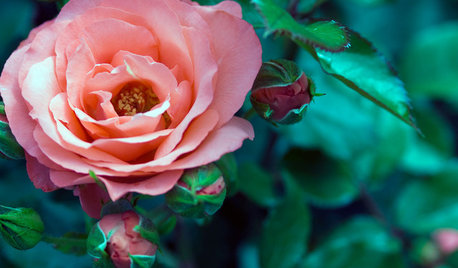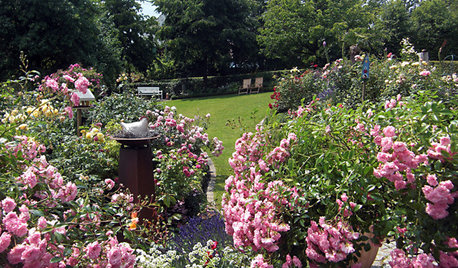Treatment for Rose Rosette
eahamel
10 years ago
Featured Answer
Sort by:Oldest
Comments (37)
buford
10 years agohenry_kuska
10 years agoRelated Discussions
presence of Rose Rosette Disease on the climbing roses at the Ral
Comments (1)Oh, that is so sad to hear. I hate this stuff! I wonder if there will ever be a treatment for it, besides removal, that works....See Morerose-rosette-disease-symposium-the-american-rose-center
Comments (0)See: https://www.eventbrite.com/e/rose-rosette-disease-symposium-the-american-rose-center-tickets-49415018651...See Morerose rosette - plants to replace roses with
Comments (3)The following was stated: " where the similarities end is with the witches broom and of course the massive amount of thorns." --------------------------------------------------------------------------- H.Kuska comment: new growth on some roses have more thorns than the mature growth on the same bush. I assume that this is to help protect the new softer growth against "critters". The witches broom can be also caused by herbicide damage. "Symptoms of RRD may resemble injury from herbicides. If herbicides make contact with rose foliage in late summer or fall, the plants may show damage immediately or the chemical may be stored in the buds. In the latter case, damage becomes evident when buds swell and leaves emerge the following spring. Some herbicides can cause a witches’ broom symptom on roses, as well as yellowing or stunted, narrow leaves (Figure 10). However, excessive thorniness and unusual red pigmentation do not usually occur with herbicide injury. Most herbicides are non-selective, so other plants in the area may also show unusual symptoms of distortion and discoloration." The above witches broom information is from: http://factsheets.okstate.edu/documents/epp-7329-rose-rosette-disease/...See MoreIs this normal for rose bush? Or is it rose rosette disease?
Comments (12)I also meant to say that the RRV infection pictured in Our Lady occurred in 2008. So she has gone another 12 years after the cane was cut off. This was not the only RRV rose I've done the cut back to with success. About 10% of my RRV roses with ONLY ONE cane involved recovered if that cane was cut down to the crown immediately upon observation. That means that 90% of the time new growth will also sprout with symptoms showing you that the virus has spread throughout the rose and the whole rose needs to be removed. In the cooler months obviously the growth is slowed down so symptoms may take awhile to emerge.......I say this so that people who have roses that are not easily replaced have a glimmer of hope. I know too well about the decimation RRV can cause. Most are not aware that Tulsa had the 2nd largest rose garden at one time in the United States. When RRV first hit it wiped out 80% of their roses and continued to kill more. Now there are just a hand full from what they used to have. It was a devastating blow to a garden that was installed by the WPA (older folks will know what that organization was). It mowed mine down as well. So if you don't want to mess around with it I understand more then some.......................Maryl...See Morecatsrose
10 years agoUser
10 years agocatsrose
10 years agoeahamel
10 years agoUser
10 years agoeahamel
10 years agoanntn6b
10 years agoandreajoy
10 years agomichaelg
10 years agoeahamel
10 years agohenry_kuska
10 years agomichaelg
10 years agolou_texas
10 years agodirtdoctor1
10 years agohoovb zone 9 sunset 23
10 years agojerijen
10 years agodublinbay z6 (KS)
10 years agocatsrose
10 years agoporkpal zone 9 Tx
10 years agoerasmus_gw
10 years agomarymm2
7 years agoportlandmysteryrose
7 years agolast modified: 7 years agomarymm2
7 years agoportlandmysteryrose
7 years agostillanntn6b
7 years agoSheila z8a Rogue Valley OR
7 years agomarymm2
7 years agonikthegreek
7 years agostillanntn6b
7 years agoportlandmysteryrose
7 years agolast modified: 7 years agoUser
7 years agomarymm2
7 years agohenry_kuska
7 years agolast modified: 7 years agohenry_kuska
6 years ago
Related Stories

GARDENING GUIDESGreat Design Plant: Knock Out Roses
As glorious as their high-maintenance kin for a fraction of the work, Knock Out roses make even beginners look like garden stars
Full Story
GARDENING GUIDESWhat Kind of Roses Should You Grow?
Want to add the beauty of roses to your garden? Find out which ones, from old-fashioned to modern, are right for you
Full Story
GARDENING GUIDESLearn the Secret to Bigger and Better Roses
Grow beautiful roses using both ordinary and unusual soil amendments
Full Story
GARDENING GUIDES5 Sweet to Spirited Pink Roses for an Enchanting Garden
Whether you go demure or daring, there's a pink rose here to make you flush with garden pride
Full Story
GARDENING GUIDESRoses: Crowning Touch of Gardens
Whether you're the Miss or Mister America of gardening or take a hands-off approach, roses can be a winning addition to your landscape
Full Story
WINDOW TREATMENTSBedroom Window Treatments to Block the Light
Sleep tight with curtains, shades and more designed to keep out bright rays while letting stylishness in
Full Story
STAIRWAYSThe Upstairs-Downstairs Connection: Picking the Right Stair Treatment
Carpeting, runner or bare wood? Check out these ideas for matching your staircase floor treatment to upstairs and downstairs flooring
Full Story
WINDOWSTreatments for Large or Oddly Shaped Windows
Get the sun filtering and privacy you need even with those awkward windows, using panels, shutters, shades and more
Full Story
ARCHITECTURECeiling Treatments Worth a Look
Add beams, boards and other embellishments to that blank expanse for a room that looks dressed from head to toe
Full Story







User